Romance comics had a hard time going in the 1960s and 1970s. As a useful plot device the dreams of a girl finding a husband and setting up home that populated the love titles of the previous two decades were now out of fashion. Now women had to be portrayed as liberated, sexy, confident and no longer defined by a man or the traditional roles of a homemaker and housekeeper. In the midst of a cultural revolution and with sales threatened by the theme of the books, comic companies were forced to portray modern, educated and strong liberated women who were not defined by their partners and traditional female roles.
However, the romance comics of the 1960s and 1970s became a bit schizophrenic, due in no small part to the old men who were the editors. They tried to make the stories contemporary to the times but usually failed, unable or unwilling to tell a story that was different from what they were used to in their experience and also partly because of the Comics Code Authority, which was slow to embrace changes like the graphic depictions of bra-burning and Jane Fonda-like characters having orgies.
The young ladies of the Bronze Age romance comics were definitely liberated but it was a superficial sort of surrender to popular culture and feminism. While the women were no longer living at home, were out on their own in the big city, earning a living, dressed in "happening" fashions and were active sexually (never stated but the subtext was there), the idea of what constituted a liberated woman in the comics of the time was still very mired in the stories of the 1950s. More often than not the heart-sick young woman searching for love was a secretary, maid or nurse. They were usually confined in the story to supporting or 2nd tier jobs while mooning over the handsome doctor or professional man that callously ignored them. Rarely was the woman considered an equal in the setting where the drama took place and while there were usually a few nods to feminism and equality the sentiment was only panel deep.
A typical example of a liberated female romance story of the time can be seen in the Marvel Comics title My Love #20 (July 1974) in the story "The Boy Who Can't Be Mine!".
The end of romance comics was in sight by the time this issue hit the stands. If the company repackaged as new a story from another book from barely two years before then it is clear the publisher is saving some cash and not really supporting the genre. Romance comics limped along a few more years before they finally withered and died, unlike love, which lasts forever.
The featured story is about a secretary named June. She is considered to be a little more than office furniture to her hip boss, the high-powered book and art agent Bradley Grey. Bradley is hardly the boy the story title and June claim he is and craves excitement and stimulation. Busy being awesome, Brad does not even notice that June is alive, which makes her sad and depressed and feel worthless.
June has such poor self esteem from Brad's failure to notice her that she does not remember that she is incredibly hot as this bathtub scene from the book reveals. Maybe that turtle-neck sweater Brad is always wearing is too tight and is restricting the flow of blood to his brain or something. It was a common feature of nearly every romance comic book story that the troubled girl is featured in some manner of sexy scene in the story somewhere. Often the women were portrayed changing clothes or lounging around in their lingerie. Not even go-to guy romance comic inker Vince Colletta could spoil some of those. He inked a majority of romance titles and apparently liked scantily clad women as he seemed to spend a little more time on their figures than he did for the backgrounds and other art.
As usual in these stories and much like every similar story of the past three decades, June is portrayed as obsessed with her unrequited love interest. Also much like every other romance book this includes the heroine having a gratuitous, feverish, naughty, dirty, filthy, nasty, hot hot hot, exciting sex dream sequence when they fitfully drop off to sleep.
Since attractiveness and being highly competent at her job fails to make an impression on Brad, June then resorts to the time-honored and most effective way to trap a man into marriage: BEING JUST LIKE THEIR MOTHERS!
It is only when June plays house and steps into the traditional domestic role of his mommy that Brad finally notices her and realizes he is in love. Actually, he noticed her "talent" whatever that may be. I could guess, though, and I would bet it has to do with with something really Freudian and icky.
If this was a 1950s romance comic June would be shown in an apron preparing dinner in the final scene while her husband read the paper and smoked a pipe in the background. Since this story was published in the 1970s the promise of marriage is only hinted at. But for the young female reader a permanent relationship was certainly implied since it was "true love" which everyone knows lasts eternally. The bonus about this era's form of the liberated female romance story is that for a male reader who secretly reads his sister's copy of the book the marriage-ambiguous endings hinted at hot no-strings sex while at the same time it gave them a few nicely crafted drawings of women in their underwear.
Tags: Comic Book Romance Feminism

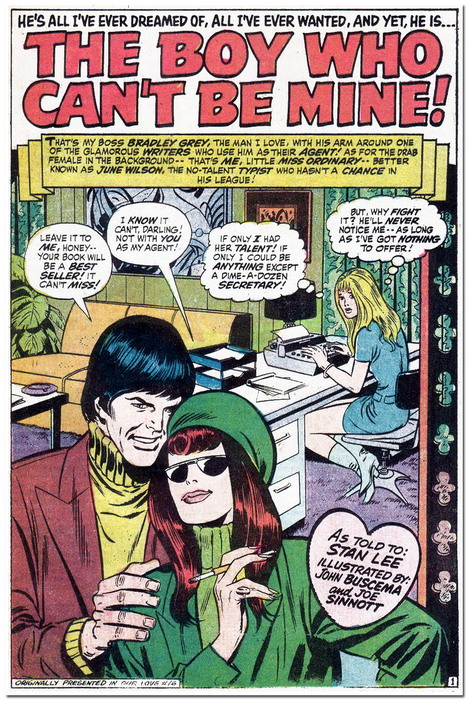
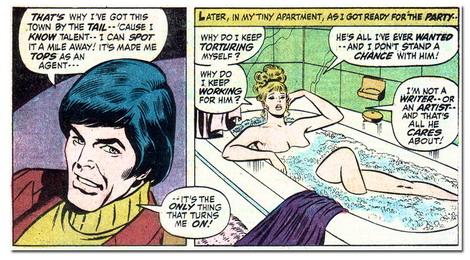
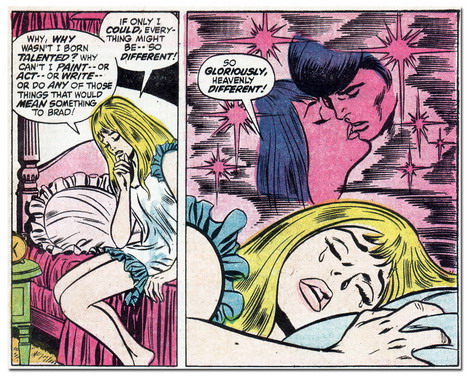
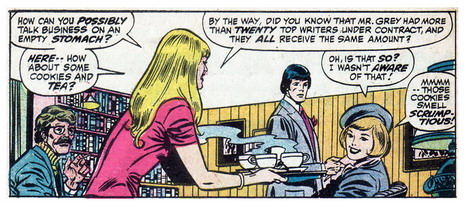
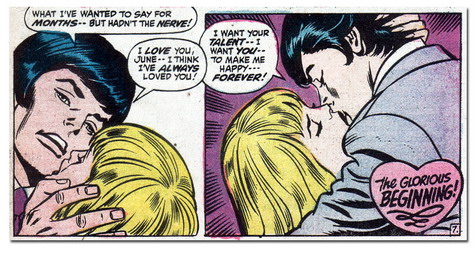
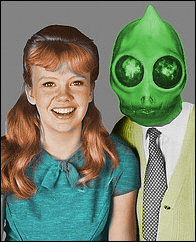

























C'Mon, it's obvious!
ReplyDeleteShe drugged the food.
Whoa, Gwen Stacy is hot!
ReplyDelete(Although that head in the bathtub panel is tiiiiiiiiny!)
That is actually a very good overall analysis of romance comics in general. Fun to read!
ReplyDeleteMan, I love, love, L-O-V-E that next-to-the-last panel. Looks like he's gonna bite into her face like it was a crisp, red apple. Which is probably just a friendly greeting in whatever non-Euclidean universe spawned him.
ReplyDelete"Hey Stan, does this head look wrong to you? It's kind of..." "Two eyes, mouth on bottom. Rinse out your brush, it's Miller Time."